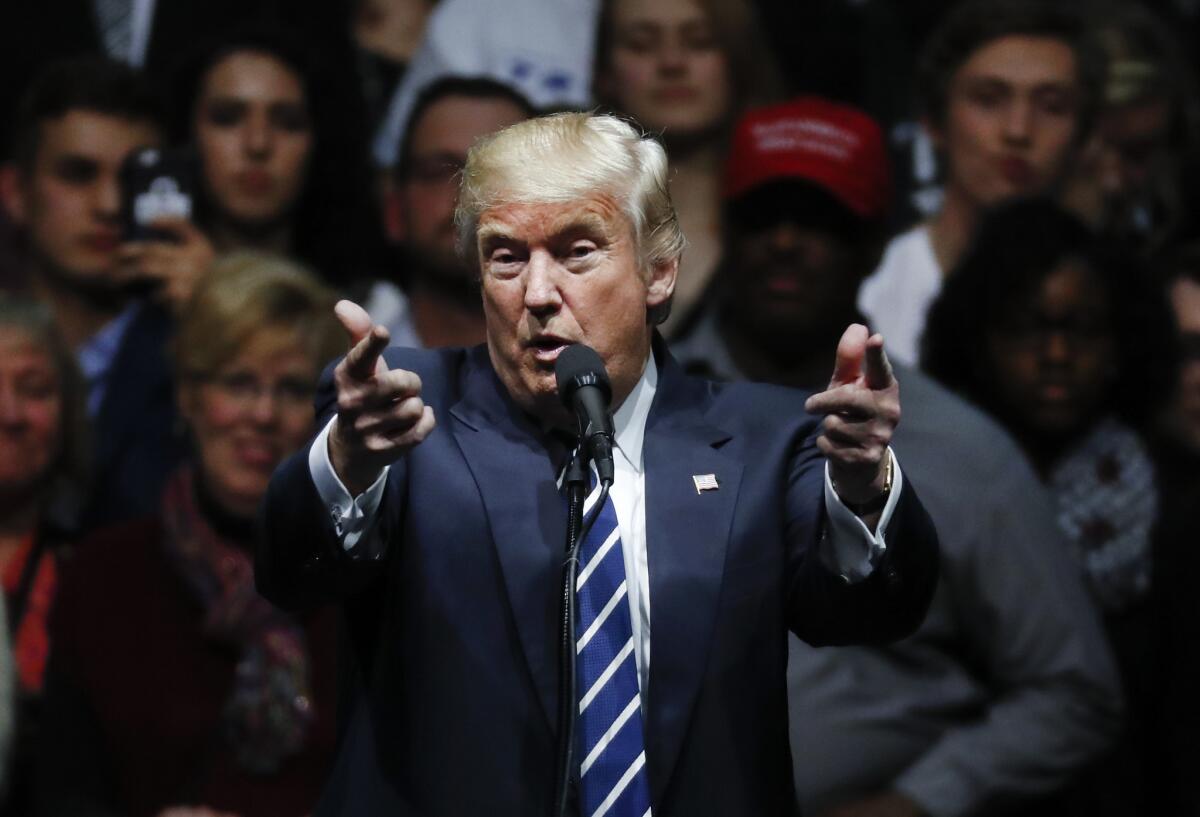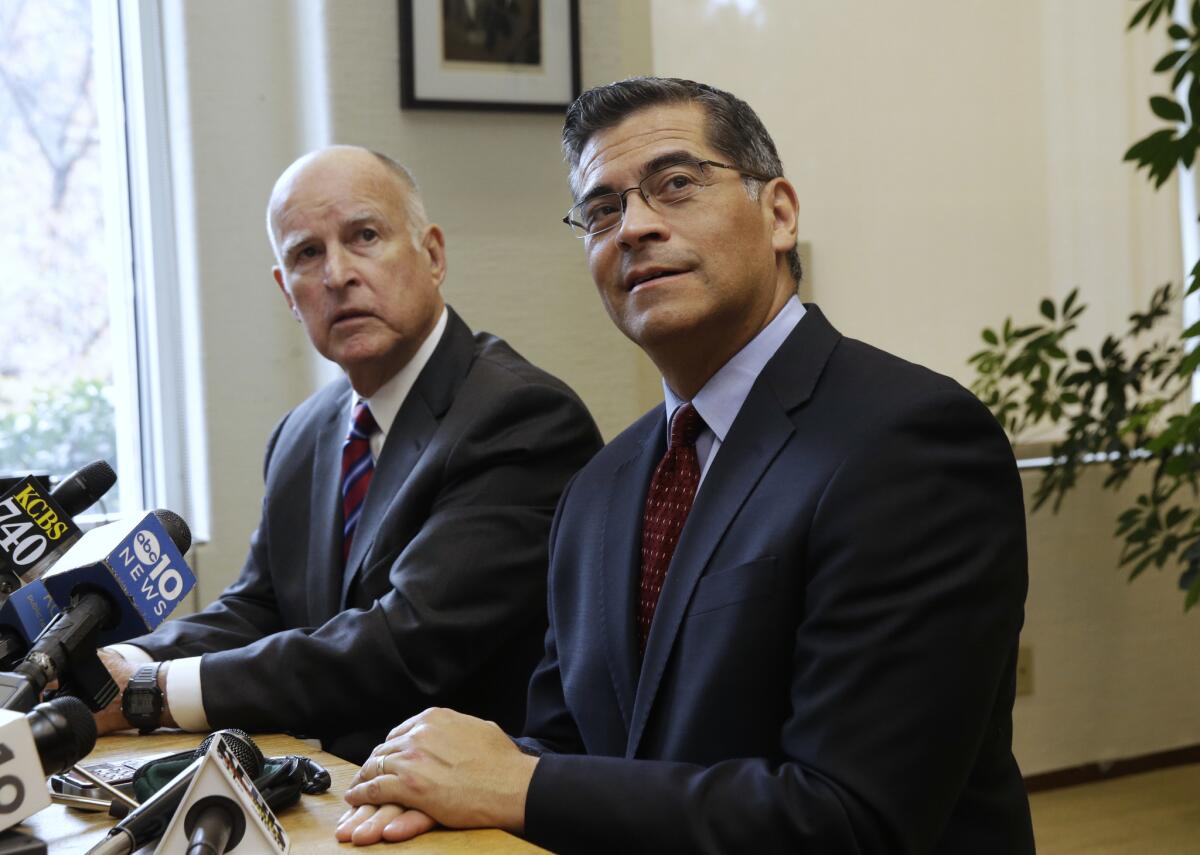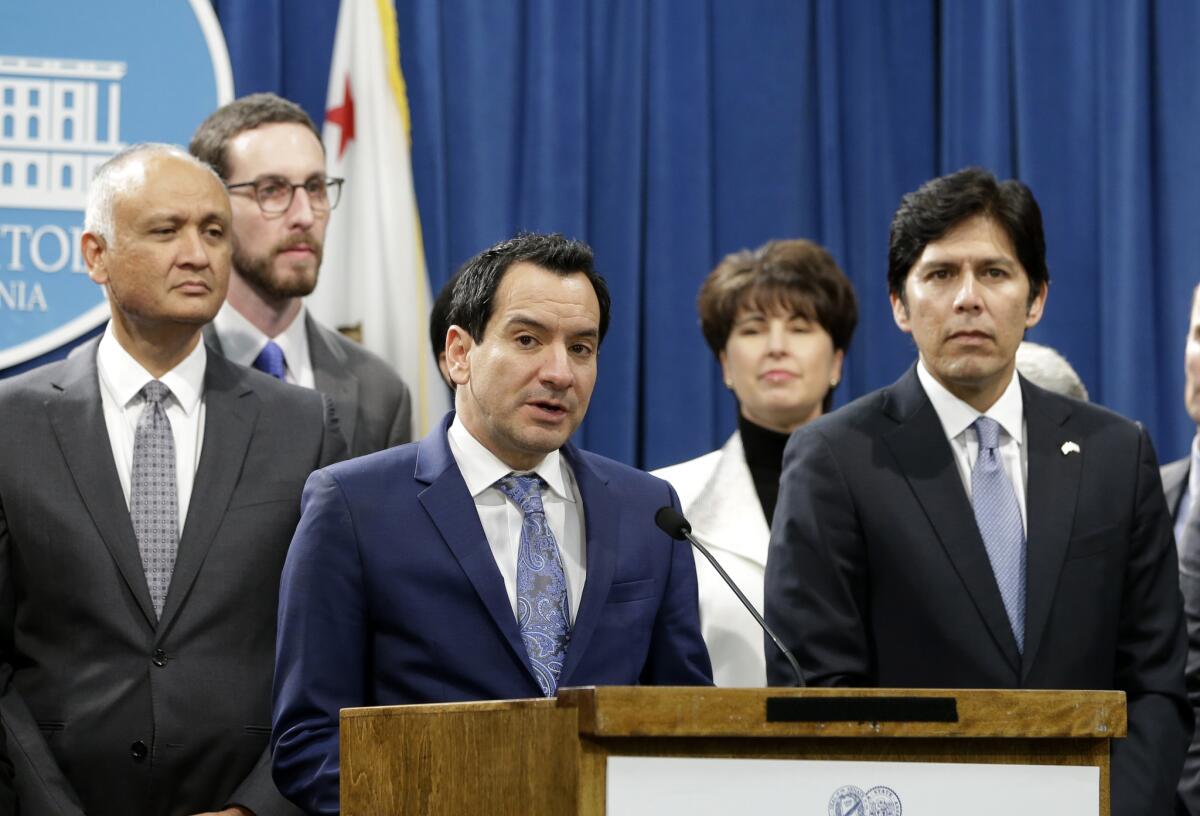California is itching to take on Trump. Here are the prominent figures leading the charge

- Share via
California’s leaders have reacted to
But within the overarching hostile tone, the dissent from the nation’s most populous state, which sided decisively with Hillary Clinton in the Nov. 8
Beyond the state’s representatives in Washington — including Democratic Minority Leader
The six California congressional members most likely to help, or hinder, the Trump administration »
The state officials
The state’s highest-profile defender is Gov.
“We’ve got the scientists, we’ve got the universities, we have the national labs and we have the political clout and sophistication for the battle — and we will persevere. Have no doubt about that,” Brown said Wednesday in an address to climate scientists.
Los Angeles Rep.

"We won't shy away from representing and defending what we stand for as Californians," Becerra told reporters last week. "But we're not out there to pick fights."
More aggressive has been Secretary of State
If Trump’s positions are “contrary to the policies we’re pursuing in California or are harmful to the state or the nation, we’ll challenge him every step of the way,” Padilla said in an interview.
Meanwhile, leaders of California’s higher education system have urged Trump to allow students who were brought to the country illegally as children to continue their studies without fear of deportation.
California has more than 200,000 people who have applied for deportation protections under an Obama administration program called Deferred Action for Childhood Arrivals, or DACA, more than any other state.
UC System President
The lawmakers
Starting with a fiery joint statement just hours after Trump won the presidency, California’s top Democrats in the Legislature — Senate President pro Tem Kevin de León and Assembly Speaker Anthony Rendon — have struck a decisively defiant anti-Trump tone.
“Californians do not need healing. We need to fight,” Rendon said in a combative speech at last week’s ceremony swearing in new legislators, injecting a bellicose note into a typically cheery affair.
Legislative leaders have staked out immigration as the first battleground. De León has introduced a measure that would bar state and local resources from being used to aid federal immigration officials in deportations.
In announcing the bill, SB 54, De León vowed that California would be “the wall of justice” for people in the country illegally if the federal government ramps up deportations.
Sen.
Other proposals would commit state dollars to defend people without legal immigration status against removal from the U.S. One bill, SB 6 by Sen.

The contenders
The shades of anti-Trump stances are also coloring the next marquee political showdown in California: the 2018 governor’s race.
“I don’t think it’s time to be timid — at all,” Newsom told reporters on Wednesday. “I take him quite literally in terms of what he wants to accomplish and how he wants to go about doing it. And if you do take him literally, then there is only one response, and that is to prepare for an assault on environmental protections, on immigrant rights, on people’s health and welfare, and not wait to respond to it.”
Fellow Democrat and former Los Angeles Mayor
A third Democratic contender, state Treasurer
But the low-profile Chiang was cited in the New Yorker as a possible example of how to push back against Trump from inside the government. In 2008, Chiang, who was then state controller, refused to implement an order by then-Gov. Arnold Schwarzenegger to slash state worker pay. He said his takeaway from the standoff was that those inside government should follow their conscience.
Liberal hedge fund billionaire Tom Steyer has toyed with a gubernatorial run, although he said Trump’s unexpected win had made him reconsider his plans. In an interview with The Times, he said his initial aversion to Trump has only hardened with the president-elect’s actions.
“What we’ve seen so far in terms of both behavior and nominations has fulfilled every one of our expectations and fears,” Steyer said.
Regardless of his future ambitions, Steyer said he plans to continue opposing Trump through a “citizens’ coalition,” marrying grassroots work, voter registration and other political organizing.
The locals
Preparing for battle against the Trump administration extends far beyond Sacramento. In California’s major cities, local officials have struck their own anti-Trump positions.
In Los Angeles,
Los Angeles County Supervisors Hilda Solis and
In Northern California, San Francisco public defender Jeff Adachi has proposed a $5-million unit in his department to defend immigrants in the country illegally from deportation.
And earlier this month, the city of Santa Ana voted to become a sanctuary city to protect those without legal immigration status — a largely symbolic measure that nevertheless underscored the dramatic demographic changes underway in what used to be a stronghold for California Republicans.
Speaking of the GOP, the most compelling figure on the local level to watch could be San Diego Mayor
Post-election, Faulconer has urged unity, saying of Trump at a Los Angeles Times event, “he’s our president — we have to come together now.”
But Faulconer also did not shy away from touting his city’s close economic relationship with Mexico. If Trump follows through on his promise to impose tariffs on goods imported from Mexico, a move that could have significant repercussions for San Diego’s economy, Faulconer’s role as a pro-trade GOP mayor of a major border city may end up giving Trump some significant heartburn.
The techies
California’s politicians have so far been the most enthusiastic in seizing the anti-Trump megaphone. But Silicon Valley may also find itself in conflict with the new administration.
In his highly anticipated summit with tech leaders on Wednesday — organized by billionaire investor and Trump ally
But there are early signs of ruptures in Trump’s relationship with Silicon Valley. Twitter and Facebook have publicly stated they would not assist in building a registry of Muslims in the United States.
And while executives have been relatively mum on Trump since his win — a silence that tech journalist Kara Swisher excoriated in a recent column — prominent investors such as Chris Sacca and LinkedIn co-founder
Follow @melmason on Twitter for the latest on California politics.
ALSO
The six California congressional members most likely to help, or hinder, the Trump administration
Texas was Obama's chief antagonist. In Trump's America, California is eager for the part
California's new legislative session begins with a message: We're ready to fight Trump
Get the L.A. Times Politics newsletter
Deeply reported insights into legislation, politics and policy from Sacramento, Washington and beyond. In your inbox twice per week.
You may occasionally receive promotional content from the Los Angeles Times.








